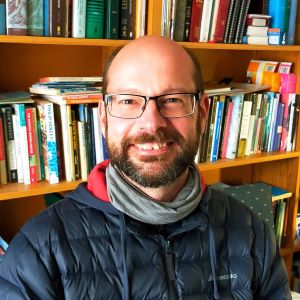by Lachlan Bull

Jubilee! A word that resonates with the sounds of celebration. Because it is! Finally, a time of redemption, a time of restoration, a time of rest!
Yet, behind this small word, lies so much. And perhaps we can better understand the word, or maybe enter into what it might reveal, if we change how we see it; if we see it not just as a word, but more as a boundary. A boundary marker, maybe even a cairn at the edge of a field, marking not just a static point, but also a crossing point, a place in which we cross from what was, to what might be.
And perhaps if we continue along the journey of seeing this jubilee celebration like a cairn, we might even imagine that in some strange way this jubilee cairn is made from rocks that you’ve been carrying to the edge of the field. Even though you’ve reached the cairn, even though you could walk beyond it, you know that it’s not yet finished. Someone else seems to have been here before you, but you seem to know you need to carry on building it.
There is more work to be done, before you can carry on past the cairn and into the time of Jubilee. And so you turn back and look at the field you’ve been travelling through. A field full of rocks. And you realise what you need to do.
So you head back and start pulling the stones out of the field and placing them on the cairn.
And as you grasp each stone, as you cautiously wrestle it from the clinging earth and into the light, as you carry it away and carefully place it with all the others, the field in which you are struggling starts to slowly change.
Where once there was mainly rock and soil, where once the landscape was hard and unyielding, new life has a chance. Seeds land in soft soil, safe from wind and sun. Rain no longer falls and rushes across the packed earth, but instead settles and soaks into the ground.
But some of the stones remain. They’re too deeply embedded in the ground, and at this point, you’re too tired to pry them out. Perhaps later, at another stage, you’ll have the strength and understanding to remove them.
Yet, in the meantime, life continues to flourish in the field. Small tender shoots begin to grow. Grass and flowers begin to spread. In the places of hardness and desolation, new life begins. In those places where the stones remain, the ground around them is softened by the grasses and wildflowers that begin to grow amongst them.
And sometimes others come into the field. They see what you’re doing and they stop as they pass through, helping you to pull out some of the bigger stones, and together, you carry the stones and add them to the cairn.
And as the cairn grows, stone by stone, moment by moment, others begin to notice. Other travellers, making their way across their own fields, see the slowly growing stone cairn. See you moving backward and forwards over the field, carrying rock after rock from the field and onto the cairn.
They edge towards it, curious to see this signpost marking the way, wondering at the ground that is suddenly lush and yielding under their feet. Wondering what has happened to so radically change the ground upon which they travel.
And you see them, and they see you. Weary, travel worn, with blisters and calluses on your hands from all the rocks you’ve pulled from the earth.
But they can see that you have a story, and they want to hear it. A story about having the courage to slowly pull the rocks from the soil of your past and give them a new meaning. A story about a field that is still there, but now looks and feels different. A story about a person taking the time to carefully look over the past, exposing and removing the stones that used to litter the landscape, and using them to help others find their own way forward.
As I approach my Year of Jubilee, I can look back and see many rocks in the fields of my life. Some of the stones are smooth and beautiful. Others are cracked and damaged. And with hindsight, I see now that some of the stones were already in the field before I noticed them. Just hiding below the surface. Some rocks were placed in my field by others, and some I actually carried in with me. Yet as I look back over the fields, I realise that all these rocks – some beautiful, some broken, some jagged – make up the landscape of my life. They make up part of who I am.
And I know that I have a choice about what to do with these rocks that litter the landscape. Leave them alone, leave them in the past, leave them heavy on the ground, smothering any growth that might be.
Or perhaps I might decide to slowly and thoughtfully take each one out, look it over, re-evaluate it in the light, and use it to help guide others.
So, as I journey towards my Jubilee year, I guess I’m beginning to wonder how I might redeem those parts of my life that lie in the past like broken rocks.
What is the value in each experience, both the beautiful and not-so-beautiful? And how does my understanding of those experiences change how I understand myself, relate with others, and journey with God? Because sometimes as I wrestle with these stones, I feel like I’m joining Jacob at the Jabbok. Perhaps, sometimes it’s not so much stones I’m wrestling with, but God, as I try to understand life and faith and pain and beauty and love and suffering.
And I wonder, as I pass this jubilee-cairn of my life, what will be in the next field?
But whatever there is, I expect that I’ll be able to look back at the cairn and remember that wherever I go, God already has been. Because as I look back, I’ve got a hunch about who first started gently pulling those rocks out and placing them on that cairn at the edge of my field.
Lachlan Bull graduated from Carey Baptist College in 2018. He is the Sole Pastor at Greymouth West Coast Baptist Church.

Lachlan – thank you for this! What a rich and moving description of Jubilee for today’s people of God